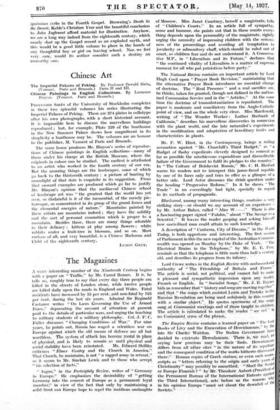The Magazines
A vEnv interesting number of the Nineteenth Century begins with a "paper on ." Trine," by Mr. Carrol Romer, It. is; he tells iii, roughly true to say that every day -three people are killed in the. streets of. London . alone, while .twelve. people are killed daily upon the roads in England and Wales. -Fatal accidents have increased by 55 per cent. add non-fatal by 125- per Cent. diwing the last six years. Admiral Sir Reginald Custance writes " On Laws Governing the Use of Armed Force," deprecating the amount of attention, at present paid to the details of particular wars, and urging the teaching to military students of a military philosophy: Col. J. F: C. Fuller discusses " Changing Conditions" Of War." For nine years, he points out, Russia has waged a relentless war on Europe against which the old means of defence- are all but Worthless, The system, of attack has beC0111e. moral in place. of .physical,and is likely to remain .so until physical and social stability hive been reinstated. Mr..E.dward.Shillito, criticizes "Elmer Gantry and the Church in America.", That Church, he maintains, is not " a ragged army in retreat," as -it seems to Mr. Sinclair Lewis and to those who accept " his selection of faCtS." .
" Augur," in the Fortnightly Review, writes .of " Germany in Europe." He emphasizes the desirability of " getting Germany into the concert of Europe as a permanent loyal member," in view of the fact that only by maintaining a solid-front can Europe hope to repel the insidious. onslaughts of Moscow. Miss Janet Courtney, herself a magistrate, tells of " Children's Courts." In an article full of sympathy, sense and humour, she points out that in these courts every- thing depends upon the personality of the magistrate, rightly urging the necessity of impressing children with the serious- ness of the proceedings and avoiding all temptation to jocularity or admonitory chaff, which should be ruled out of court, as children fear and do not understand it. A Conserva- tive M.P., in " Liberalism and its Future," declares that " the continued vitality of Liberalisin is a matter of supreme moment for all who put patriotism before party."
The National Review contains an important article by Lord Hugh Cecil upon " Prayer Book Revision," maintaining that the alternative Prayer Book introduces no essential change of doctrine. The " Real Presence " and a real sacrifice are; he thinks, taken for granted, though not defined in the author. ized Communion Service and in the " Articles." At the same time the doctrine of transubstantiation is repudiated. The paper is moderate and conciliatory from the Anglo-Catholic point of view, and on the whole very clear. Miss Macdonald, writing of " The Wonder Worker : Luther Burbank of California," describes his marvellous discoveries in connexion with the plant world, and the late naturalist's experiments in the modification and adaptation of hereditary traits and characteristics in plants.
Mr. F. W. Hirst, in the Contemporary, brings a railing accusation against " Mr. Churchill's Third Budget," as " a Budget of flashy expedients cleverly designed to conceal as far as possible the mischievous expenditure and discreditable failure of the GOvernment to fulfil its pledges to the country." In " The Culture of Bolshevist Russia," Mr. C. H. Herford warns his readers not to interpret this janus-faced republic by one of its faces only and tries to offer us a glimpse of a better side. Lord Astor discusses the drink question under the heading " Progressive Reform." In it he shows " The Trade " in an exceedingly bad light, specially in regard to its methods of propaganda.
Blackwood, among'many interesting things, contains a very striking story—or should we say account of an experience - by Mr. Arthur Baker, called " Alice W ." There is also a fascinating paper signed "Fulahn," about " The Savage as Scientist." It leaves the reader gasping and asking himself how uncivilized man could attain to such knowledge.
A description of " Canberra, City of Dreams," in the it Today, is both opportune and interesting. The first session of Parliament in this the new capital of the Australian Common- wealth was opened on Monday by-the Duke of York. " Electrical Brains in the Telephone," by Mr. E. E. Free, reminds us that the telephone is little more than half a century old, and describes its progress from its infancy; - Lord Crewe writes in the English Review with ambassadorial authority of " The Friendship of Britain and France." The article is social, not political, and cannot fail to make a pleasant and sympathetic impression upon any reader,J . French or English. In " Socialist Songs," Mr. J. R. Rayhes„ bids us remember that " history and song are moving together .nd.th . aat the songs which assisted Lenin and Trotsky in the. . Russian Revolutian are being used sedulously.* this country with a 'similar .gbject." He quotes specimens of,the. songs sung, at COMmunist nieetings, and of /hose tanglif to children; The article is .4lc410,ca to moxo,oeteader " see red 10 no.ComMunist sense of the phiaae,.
The EMpire Pram contains a /earned paper on The Lost Books•of Livy and the Excavation Of.Herctflaneum," by the late Sir CharleS- Walston. - The Italian GoVernntent haw decided to efcealrate Herculifieurn. "'There is, vit. read, 00 saying -how' preCious may be their -finds. ' Herculanema differs from all' Ofher sites "" iii the nature of its" sepulture and the eonsequent condition of the works hitherto discovered there:" - Ronkin copies of Greek stall-lea, or even such malae scripts as " letters referring to the origin- and early years of Christianity" may possibly be unearthed. " Shall the Soviet or Europe Flourish ? "- by Mr. TheOdore Aubert (President of the Permanent Bureau of the International Entente, against the Third International), sets before us the reasons why in his opinion Europe "must set about the downfall of the Soviets." - -


























































 Previous page
Previous page